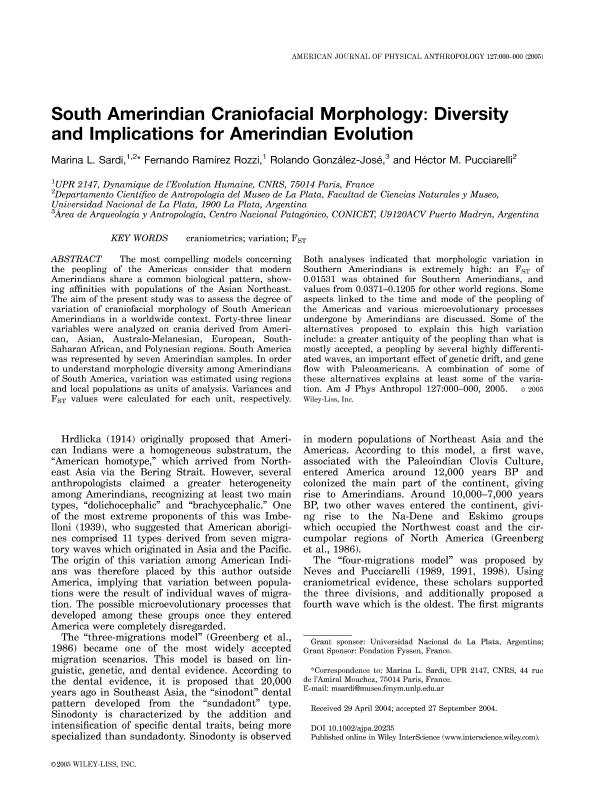Mostrar el registro sencillo del ítem
dc.contributor.author
Sardi, Marina Laura

dc.contributor.author
Ramirez Rozzi, Fernando Victor

dc.contributor.author
González José, Rolando

dc.contributor.author
Pucciarelli, Hector Mario

dc.date.available
2020-05-20T16:32:56Z
dc.date.issued
2005-12
dc.identifier.citation
Sardi, Marina Laura; Ramirez Rozzi, Fernando Victor; González José, Rolando; Pucciarelli, Hector Mario; South Amerindian craniofacial morphology: Diversity and implications for Amerindian evolution; Wiley-liss, Div John Wiley & Sons Inc; American Journal Of Physical Anthropology; 128; 4; 12-2005; 747-756
dc.identifier.issn
0002-9483
dc.identifier.uri
http://hdl.handle.net/11336/105563
dc.description.abstract
The most compelling models concerning the peopling of the Americas consider that modern Amerindians share a common biological pattern, showing affinities with populations of the Asian Northeast. The aim of the present study was to assess the degree of variation of craniofacial morphology of South American Amerindians in a worldwide context. Forty-three linear variables were analyzed on crania derived from American, Asian, Australo-Melanesian, European, South- Saharan African, and Polynesian regions. South America was represented by seven Amerindian samples. In order to understand morphologic diversity among Amerindians of South America, variation was estimated using regions and local populations as units of analysis. Variances and FST values were calculated for each unit, respectively. Both analyses indicated that morphologic variation in Southern Amerindians is extremely high: an FST of 0.01531 was obtained for Southern Amerindians, and values from 0.0371–0.1205 for other world regions. Some aspects linked to the time and mode of the peopling of the Americas and various microevolutionary processes undergone by Amerindians are discussed. Some of the alternatives proposed to explain this high variation include: a greater antiquity of the peopling than what is mostly accepted, a peopling by several highly differentiated waves, an important effect of genetic drift, and gene flow with Paleoamericans. A combination of some of these alternatives explains at least some of the variationST values were calculated for each unit, respectively. Both analyses indicated that morphologic variation in Southern Amerindians is extremely high: an FST of 0.01531 was obtained for Southern Amerindians, and values from 0.0371–0.1205 for other world regions. Some aspects linked to the time and mode of the peopling of the Americas and various microevolutionary processes undergone by Amerindians are discussed. Some of the alternatives proposed to explain this high variation include: a greater antiquity of the peopling than what is mostly accepted, a peopling by several highly differentiated waves, an important effect of genetic drift, and gene flow with Paleoamericans. A combination of some of these alternatives explains at least some of the variation.
dc.format
application/pdf
dc.language.iso
eng
dc.publisher
Wiley-liss, Div John Wiley & Sons Inc

dc.rights
info:eu-repo/semantics/openAccess
dc.rights.uri
https://creativecommons.org/licenses/by-nc-sa/2.5/ar/
dc.subject
craniometrics
dc.subject
variation
dc.subject
FST
dc.subject.classification
Antropología, Etnología

dc.subject.classification
Sociología

dc.subject.classification
CIENCIAS SOCIALES

dc.title
South Amerindian craniofacial morphology: Diversity and implications for Amerindian evolution
dc.type
info:eu-repo/semantics/article
dc.type
info:ar-repo/semantics/artículo
dc.type
info:eu-repo/semantics/publishedVersion
dc.date.updated
2020-05-15T15:56:03Z
dc.identifier.eissn
1096-8644
dc.journal.volume
128
dc.journal.number
4
dc.journal.pagination
747-756
dc.journal.pais
Estados Unidos

dc.journal.ciudad
Hoboken
dc.description.fil
Fil: Sardi, Marina Laura. Dynamique de l’Evolution Humaine; Francia. Consejo Nacional de Investigaciones Científicas y Técnicas. Centro Científico Tecnológico Conicet - La Plata; Argentina. Universidad Nacional de La Plata. Facultad de Ciencias Naturales y Museo. Departamento Científico de Antropología; Argentina
dc.description.fil
Fil: Ramirez Rozzi, Fernando Victor. Dynamique de l'Evolution Humaine; Francia
dc.description.fil
Fil: González José, Rolando. Consejo Nacional de Investigaciones Científicas y Técnicas. Centro Científico Tecnológico Conicet - Centro Nacional Patagónico; Argentina
dc.description.fil
Fil: Pucciarelli, Hector Mario. Universidad Nacional de La Plata. Facultad de Ciencias Naturales y Museo. Departamento Científico de Antropología; Argentina. Consejo Nacional de Investigaciones Científicas y Técnicas. Centro Científico Tecnológico Conicet - La Plata; Argentina
dc.journal.title
American Journal Of Physical Anthropology

dc.relation.alternativeid
info:eu-repo/semantics/altIdentifier/doi/http://dx.doi.org/10.1002/ajpa.20235
dc.relation.alternativeid
info:eu-repo/semantics/altIdentifier/url/https://onlinelibrary.wiley.com/doi/abs/10.1002/ajpa.20235
Archivos asociados
